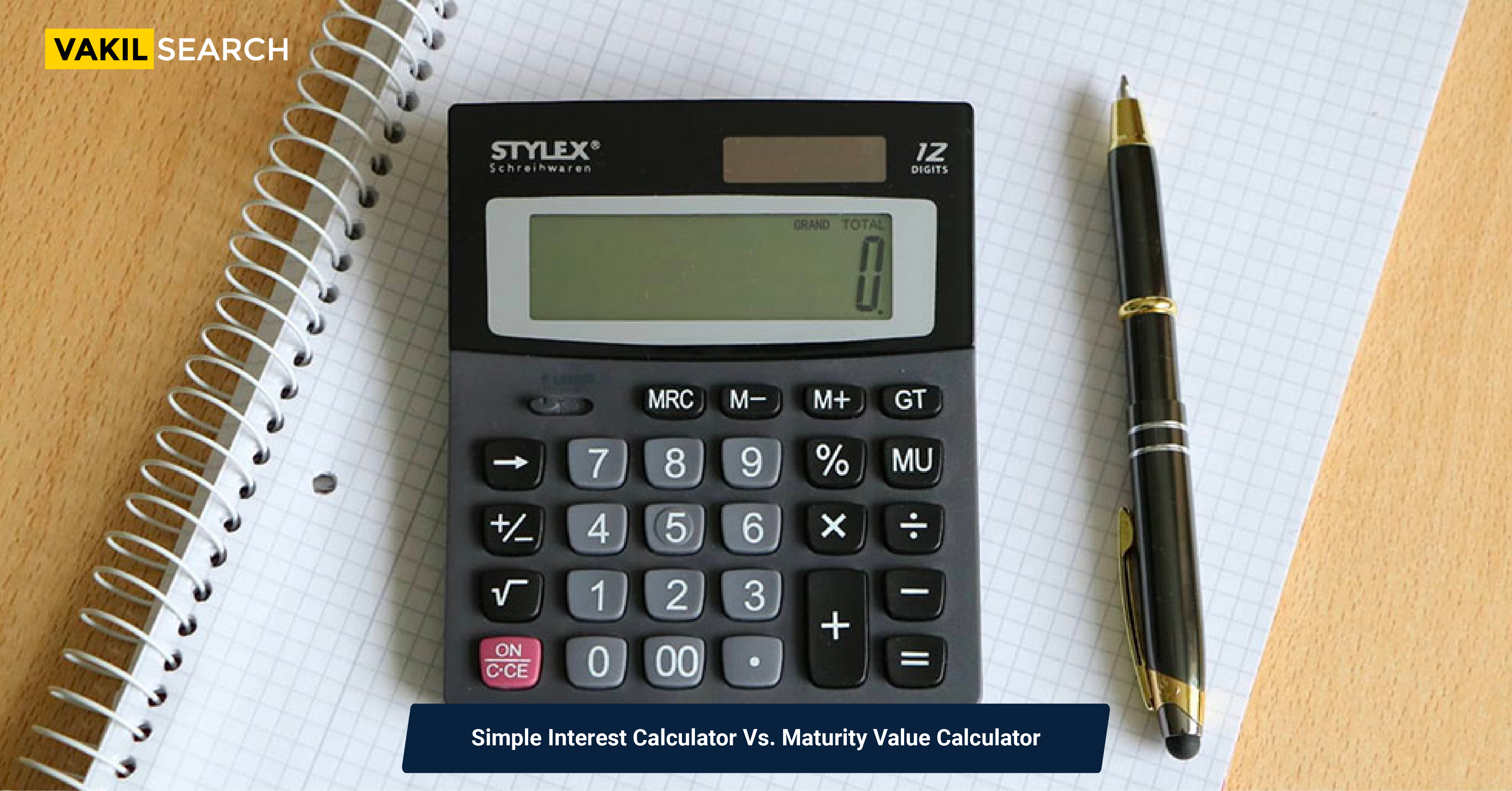Simplify your financial calculations with a comparison of simple interest and maturity value calculators. Learn which tool best suits your needs for accurate financial planning
Introduction
In the world of finance, there are many tools and calculators to help us make sense of our money matters. Two commonly used calculators are the Simple Interest Calculator vs. Maturity Value Calculator.
These handy tools can assist you in making informed financial decisions, whether you’re saving money, investing, or planning for the future. In this blog post, we will explore the differences between these two calculators, provide examples of their use, and help you understand which one is the right choice for your financial needs.
What is a Simple Interest Calculator?
Let’s start by simplifying the concept behind Simple Interest Calculators. This calculator is a straightforward tool used to compute the interest on a sum of money, known as the principal, at a fixed rate over a specific period. Simple interest is aptly named because it is calculated only on the initial principal amount.
Example:
Suppose you invest ₹1,000 in a savings account with a simple interest rate of 5% per year. Using the Simple Interest Calculator, you can determine how much interest you will earn over two years:
- Principal (P) = ₹1,000
- Rate (R) = 5% or 0.05
- Time (T) = 2 years
Now, plug these values into the Simple Interest formula:
- Interest (I) = P × R × T
- Interest (I) = ₹1,000 × 0.05 × 2
- Interest (I) = ₹100
In this example, your simple interest earnings would be ₹100 over two years. So It is Important to know about Simple Interest Calculator vs. Maturity Value Calculator.
What is a Maturity Value Calculator?
Now, let’s explore Maturity Value Calculators. This calculator is commonly used in the context of investments, particularly in fixed deposits or bonds. It helps you determine the total amount you will receive at the end of an investment period, which includes both the principal amount and the accrued interest.
Example:
Imagine you invest ₹5,000 in a fixed deposit account with a maturity period of five years, and it offers an annual compound interest rate of 6%. To find out how much money you’ll have at the end of five years, you can use the Maturity Value Calculator:
- Principal (P) = ₹5,000
- Rate (R) = 6% or 0.06
- Time (T) = 5 years
Plug these values into the Maturity Value formula:
- Maturity Value (M) = P × (1 + R)^T
- Maturity Value (M) = ₹5,000 × (1 + 0.06)^5
- Maturity Value (M) ≈ ₹6,736.09
After five years, your investment will mature to approximately ₹6,736.09, which includes both the principal and the accrued interest.
Simple Interest Calculator vs. Maturity Value Calculator
Now that we understand how each calculator works, let’s compare the two to help you decide which one suits your financial needs better.
Simple Interest Calculator: Features
Predictability: Simple interest provides a predictable outcome. Through these calculators you can know exactly how much interest you’ll earn or pay, making it ideal for straightforward calculations like savings accounts or loans with fixed interest rates.
Use Cases: These calculators useful for scenarios where interest is calculated only on the initial principal, such as simple savings accounts, short-term loans, or some types of personal loans.
Maturity Value Calculator:
Compounding Effect: The Maturity Value Calculator considers compounding effect, which means that it measures how much you will potentially earn more on your investments over time. It’s well-suited for long-term investments and financial products like fixed deposits, bonds, or investment portfolios.
Total Returns: These calculators provide a comprehensive view of your financial outcome, including both the principal and interest. It is valuable when planning for long-term financial goals or assessing the performance of investment vehicles.
Choosing the Right Calculator
The choice between a Simple Interest Calculator and a Maturity Value Calculator depends on your specific financial goals and the nature of your investment or loan. Here are some guidelines to help you decide:
When to Choose a Simple Interest Calculator?
- Prefer it for short-term savings accounts with fixed interest rates
- Ideal for calculating straightforward interest on personal loans or credit card balances
- Suitable for situations where interest doesn’t compound over time
When to Choose a Maturity Value Calculator?
- Consider it for long-term investments like fixed deposits, bonds, or retirement accounts
- Valuable for assessing the overall growth of investments, including the impact of compounding
- Helpful for planning financial goals with a long-term perspective
Conclusion
Both the Simple Interest Calculator and the Maturity Value Calculator are valuable tools in the world of finance, each serving its own purpose. By understanding how they work and when to use them, you can make more informed financial decisions that align with your goals and objectives.
Whether you’re saving for a rainy day or investing for your future, these calculators can be extremely useful in your financial journey.
To know reach out to our CAs by requesting a callback today with Vakilsearch!
Read more:-
- How Do I Calculate Simple Interest Monthly?
- What are the Benefits of Simple Interest Calculator?
- Why Is Compound Interest Important?










